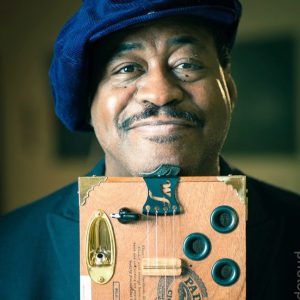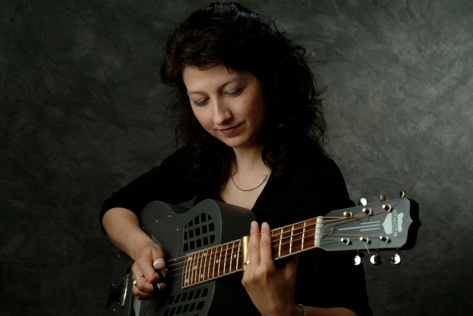Skokie Public Library Gets the Blues
July 23, 2018

The blues is a uniquely American art form. Originating in the Deep South at the end of the 1800s, the roots of the blues come from African spirituals, work songs, and folk music. Over the decades, the genre has changed with the times and its influence can be heard in much of today's popular music. Two upcoming programs at the library offer us a chance to listen to and learn about this important musical style.
Blues 101
Fruteland Jackson is a historian, storyteller, and musician. He is also the creator of the award-winning program All about the Blues Series: Blues in Schools which educates children on blues music.
Growing up on the west side of Chicago, Fruteland was eight years old when he heard his uncle Woodrow hollering in the living room. He couldn't imagine what would make his uncle behave like that, as he explains “I ran from my bedroom to the kitchen and called for my mother that something's wrong with uncle Woodrow, Mama. She was cooking over the stove. She turned her head around and smiled and said, your uncle Woodrow is having fun. I then creep toward the living room and on all fours peeped around the couch, and there was my Uncle Woodrow. He was playing a twangy electric guitar plugged into an old tube amp. My Uncle Woodrow was singing the blues.” That was the moment Fruteland first heard the blues. He's loved it ever since.
Fruteland’s mission is to make sure that younger generations are exposed to blues music and learn its history. “Younger audiences appreciate seeing and hearing the blues performed and how the music that they listen to today evolved from the blues," he says.
In 2010, Fruteland reached his one millionth student after teaching for 13 years in schools and colleges across the country. He believes that, while young people are exposed to a lot of different music, blues has a way of engaging young people in a unique way. Fruteland also believes playing blues music is an important way to express oneself. “It lets you know that you are not alone—that someone has been where you're going and that everything is going to be alright,” he says. “The blues is the recognition of a tragedy and an optimism to deal with it.”
Learn more about the blues from Fruteland Jackson at his presentation Blues 101, Thursday, August 2, 2018, 7:00 pm-8:30 pm. Register now!
Blues Guitar from Mississippi to Chicago
Donna Herula is a musician, songwriter, and instructor at the Old Town School of Folk Music. She is the youngest child in a musical family of five children. When she was ten years old, her older brother was playing saxophone in a neighborhood bar band. One day she asked him if his buddy could teach her how to play guitar. By the time she was finished with high school she was writing and performing her own music on stage.

As Donna got older, she started learning more about Delta and country blues. She has spent her entire adult life playing the blues to appreciative audiences all over the U.S. and the world. She’s learned a few things along the way, one of which is that talent is not something you either have or haven't got. “Some people think that musical talent is innate,” Donna says. “I've seen a lot of people who started an instrument or began to write songs later in life that have really grown. By making a little time for it, you would be amazed by how much you can improve and how much enjoyment you can get from playing music.”
Donna’s performance at the library is called Blues Guitar from Mississippi to Chicago, so it’s natural people might wonder what the regional differences are. “Mississippi blues music developed as a way to cope with the hard times people experienced working on the plantations in the Mississippi Delta area,” she says. “The music was emotional and expressive."
An important part of the music is "call and response" where the leader calls out a phrase which is then repeated by other musicians or even the audience. The music was kept simple out of necessity and many times a single performer would provide the bass, rhythm, lead, and then stomp their foot to keep time as they sang or played harmonica. "This kind of blues was common in the 1920s and 30s and is the type of blues that I like to play," Donna says. "In the 1940s and 50s, a lot of people, including musicians, traveled north to find jobs in the cities like Chicago, St. Louis, and Detroit. In order to be heard in bars where factory and other workers would come after their shifts, the music needed to be louder. So the Mississippi/Delta Blues was amplified using amps and electric guitars instead of acoustic guitars."
Come hear Donna Herula play the blues at her presentation Blues Guitar from Mississippi to Chicago, Sunday, August 5, 2018, 3:00 pm-4:15 pm in the Petty Auditorium.